“In a gentle way, you can shake the world.”
― Mahatma Gandhi
My ordinary conversation with a waiter when ordering cold drinks goes as follows:
“Can I have a mango juice (pineapple juice, mojito, ginger beer) and no straw please?”
“No what?”
“No straw”
“Ok, weirdo,” they don’t actually say it out loud, but I can read it in their amused eyes.
“But really, no straw, ok? I mean it. I don’t need a straw,” I am trying to keep eye contact for as long as possible to make sure the meaning of the request sank in.
“Ok!” says the waiter, but I, with my superhuman abilities to read minds, can definitely hear “Ok, lady, I got you! You don’t have to repeat it three times!”
I get it. I come off as arrogant and annoying. Oh well! Based on my personal experience, though, if I ask for “no straw” once, there’s at least a fifty percent chance of getting a straw anyways. And I don’t need it. Not using disposable straws is one of the little steps I am doing to reduce my negative impact on the world.
Why We Need to Practice Sustainability in Sri Lanka
Last year when I came to Sri Lanka for Aurudu (Sinhalese and Tamil New Year), a mountain of trash collapsed destroying houses and killing approximately thirty people. If you are Sri Lankan, I don’t have to go into details, you know them better than me. I thought then: if the government doesn’t act now, it will never act.
A few months later I came across a video on Facebook showing the consequences of the tragedy and declaring that Sri Lankan government has prohibited the use of plastic shopping bags, plastic lunch sheets, and disposable decorations. Whoa! So they can be quick and effective when they want to. Impressed and extremely proud, I shared the video.
What I didn’t realize is that not all plastic shopping bags were prohibited, but only the ones thinner than 20 microns. Here I come to Keels with my reusable bag and hope in the bright future only to see a cashier packing a bottle of juice into a plastic bag and then into another one for good measure. Waaaaait a seeeecond!
My bad, I know. I shouldn’t be so naive. The government is taking steps in the right direction, and it’s a great start. We cannot simply ban all plastic. But here’s the thing. While the authorities cannot change laws in a day, you can make an impact right here and now. The shopping bags will not disappear from supermarkets tomorrow, but, as an individual, you have the power to not use them.

Can One Person Make a Difference?
It might seem like too little of an impact to even try. But look at it this way. If you want to eat healthy, you don’t wait for the government to ban all McDonald’s restaurants, you just don’t go there. By not eating at McDonald’s you are not decreasing the overall obesity rates in the world, but you are, nevertheless, making an impact. An impact on one life, your own. Isn’t it enough to try?
The oceans are not going to become crystal clear the moment you refuse a straw. But that straw will not find its way into a turtle’s stomach. Is one turtle important enough for you to refuse a straw?
5 Little Things You Can Do to Live a More Sustainable Life in Sri Lanka
The steps below are little things anyone can do in everyday life. Some of them are as easy as saying “no straw, please”, other require a little more effort like carrying a reusable bag with you. But absolutely all of them are doable.
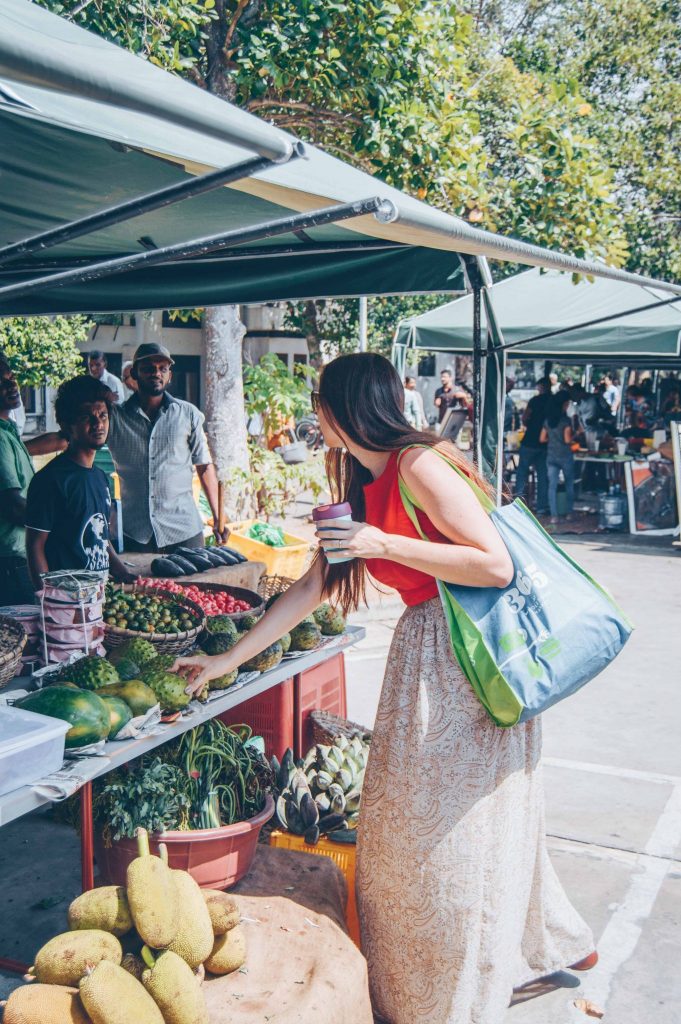
Shopping for fruits and vegetables with my reusable bag (and reusable coffee cup) at the Good Market Colombo.
Buy a Reusable Shopping Bag
As for January 1, 2018, plastic bags thinner than 20 micron were banned in Sri Lanka. What I noticed after the law was enforced is that a lot of people consider the new thicker bags ok to use.
The problem
“These are not the same plastic bags. The thin ones are bad for environment. The new ones are fine,” I’ve heard on more than one occasion. Here’s the thing: thicker bags are sturdier, they don’t fly away easily, they can hold more goods, they don’t require double-wrapping, and you can reuse them a few times. The bad news is that they are still made of plastic and contribute to the mountains of trash on the planet. You might reuse a thicker plastic bag three, four, or five times, but it will eventually find it’s way to the trash bin.
What You Can Do
Buy a reusable bag and carry it with you. Reusable bag will serve you for years to come. They are sold in all major supermarkets like Keels and Food City. The challenge here is to remember to carry it with you. I keep one in my purse at all times just in case, and another one in the trunk of the car.
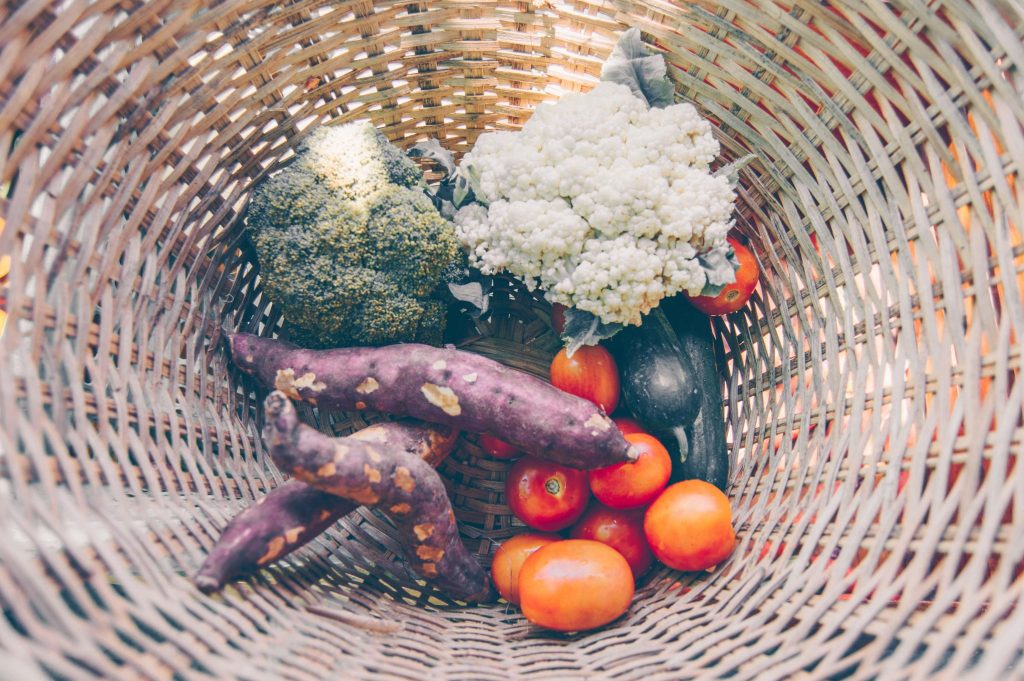
Organic vegetables from Saaraketha. I don’t use separate plastic bags for every type of veggies, but put all of them together in my reusable bag instead.
Choose Loose Foods Over Packaged
Don’t buy packaged foods whenever possible. I understand that completely eliminating packed foods from your kitchen would be tough. However, there are a few steps you can take to improve the situation.
The Problem
Every time you buy a bag of rice, flour, or chips, it ends up in a trash bin and consequently in the ocean. Plastic wrapping is not reusable and is often impossible to recycle due to its compound structure. The chips bags, for example, are made from up to seven different types of plastic and foil that have to be separated in order to be recycled. It is very hard to do even in western countries where waste management systems are more developed, let alone in Sri Lanka that started taking steps in the right direction only recently.
What You Can Do
Whenever possible choose loose foods instead of packaged. In most supermarkets in Sri Lanka you can opt for loose rice, dhal, beans, and sugar. Bring your own smaller reusable bags or plastic bags you already have at home to fill with grains and avoid the use of plastic bags provided by supermarkets. Items like dates and nuts are sold loose in Pettah Market.
Make sure to choose loose fruits and vegetables and avoid the ones wrapped in plastic. You also don’t need a separate plastic bag for two apples or a bunch of bananas. You can put them loose in your reusable shopping bag. For smaller items like chili peppers and onions, bring your own bags.
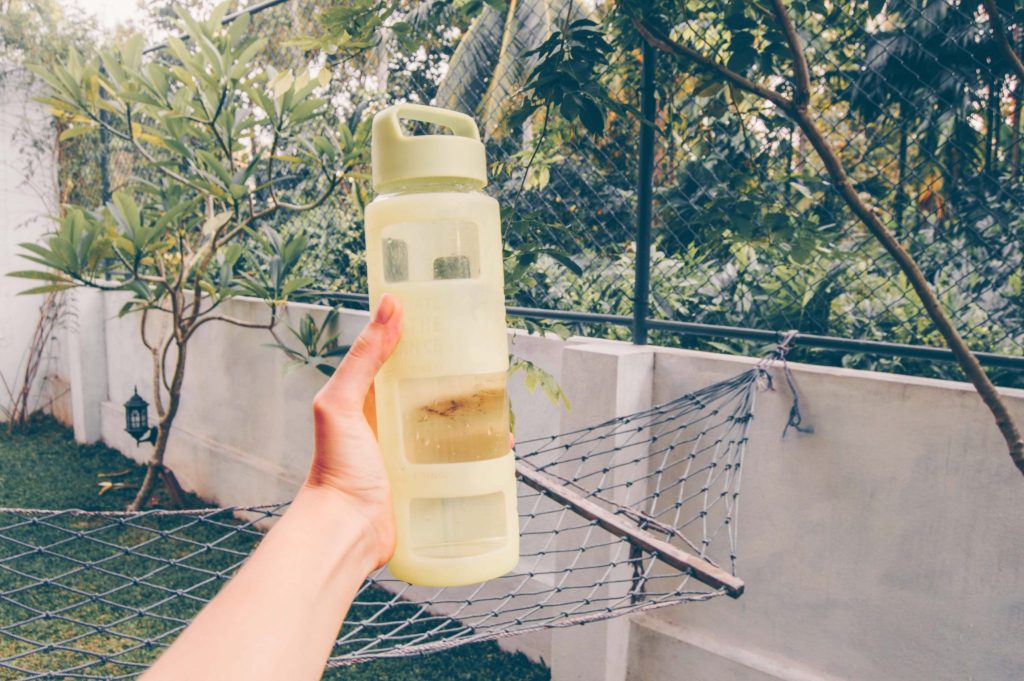
I’ve been using this water bottle for the past three years. Bonus point for me: I didn’t buy it, my neighbour who was moving cities gave it to me.
Get a Reusable Water Bottle
When I first saw a tuk tuk driver taking a sip from a vodka bottle while driving full speed on congested Galle Road, I thought to myself: well… this is it, this is how it’s all going to end. I didn’t know then that it’s common in Sri Lanka to fill empty alcohol bottles with water. Sri Lankans do a lot of things sustainably without ever realizing it.
The Problem
While many people in Sri Lanka have glass water bottles in their cars, it is not uncommon to buy a plastic water bottle from a podi kade or a supermarket. In Sri Lanka, only a drop in the ocean of plastic bottles is being recycled, with the rest simply left in the landfills where they will stay for hundreds of years to come.
Plastic bottles are not only bad for the planet, they are bad for you too. Even though many companies switch to BPA-free plastic, there are many other chemicals used in the production of bottles, that can seep out into water when exposed to heat. What does it mean for you? If you leave your plastic bottle in the car for a few hours under Sri Lankan burning sun, you’ll end up drinking those chemicals.
What You Can Do
Embrace Sri Lankan tradition of freaking out foreigners and carry around a vodka bottle filled with water. Well, that’s one way to do it. Another way is to buy a reusable water bottle that is lighter and not as fragile as glass. There are all sorts of reusable water bottles online, including some that are very travel-friendly and can even filter tap water.
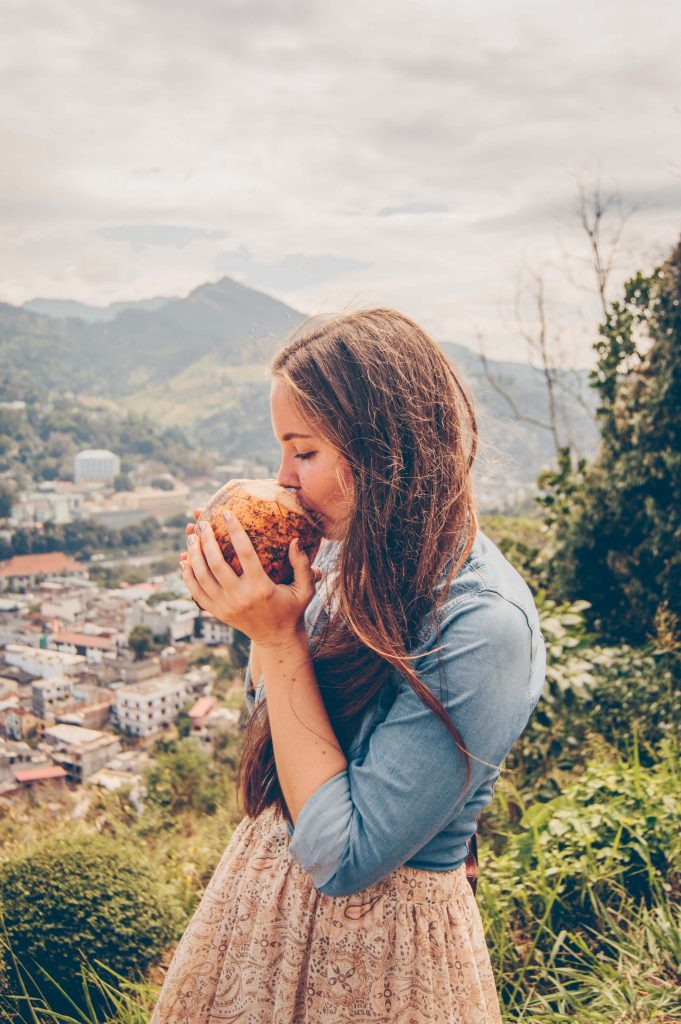
No straw needed to drink from a king coconut!
Stop Using Plastic Straws
Ever stopped by the side of the road to have a thambili on a hot day? While thambili is one of the healthiest and most sustainable ways to quench your thirst, it is usually served with a plastic straw. The thambili you had is going to decompose naturally, but that straw you used for a total of 30 seconds will stay in the landfills for hundreds and thousands of years.
The Problem
Just like in case with plastic packaging and bottles, plastic straws are not reusable. Think back to every time you drank thambili in the street or a juice in a cafe. All those straws you used are lying somewhere in a pile of trash decomposing slowly all the while releasing harmful gases like methane into air. There’s also another possibility. A straw you used for a few minutes ended up in a turtle’s nostril or a fish’s stomach (if you wanna get a visual, go to Youtube and type in “turtle with a straw in the nostril”, those videos are not for the faint of heart). Straws are one of the most picked up items during beach clean-ups.
What You Can Do
The easiest way, in my opinion, is to ditch the straws all together. You can sip your juice or cocktail from a glass. The straw is unnecessary. I especially like to drink thambili without a straw, there’s something very natural and primal about it.
But if you feel like you really need a straw in your life, there are sustainable options like metal reusable straws. You can order them online to use at home or carry one with you when going out. There are also a few cafes in Colombo dedicated to sustainable living like Cafe Kumbuk and Kumbuk Kitchen that offer metal straws.
Bring Your Own Box for Take-Away Food
This change probably requires more effort on your part than all of the above. But as with anything else, it’s a matter of habit.
The Problem
If you ever stopped by a saivar kade at night to get a quick dinner of hoppers or kottu, you know that the food is wrapped in plastic sheets and then placed in a plastic bag (double trouble). In case of kottu, there’s also an additional plastic bag filled with gravy. So one take-away dinner requires the use of a plastic sheet, a small plastic bag, and a plastic shopping bag, all of which are thrown out as soon as you get home.
What You Can Do
You can take a Tupperware box or any kind of reusable sealable box with you when going out to get take-away food. It’s easily done if you go from home, but I understand that’s not always the case. If you drive a car, keep a box inside your car so you can use it whenever needed. If you use public transport, try to think ahead of time and be prepared. It does require an effort to remember to take a box with you and make space in your bag to carry it, but a better cleaner country and planet are worth it, right?
* * *
I truly believe that anyone can follow the steps above. You will be surprised how easily it can be done once you make it a habit. Think of it this way. When you wake up in the morning you don’t think of brushing your teeth as a chore. You don’t go around complaining about it. You just get up and do it because it’s good for your health. Carrying a reusable bag with you and refusing straws will also become second nature.
I’ve heard people say things like: “But my purse is too small to carry a water bottle with me” or “But people won’t understand if I ask to put take-away food in my container”. In this case I recommend to stop for a second and think what’s on the scale. On one side of the scale is people’s (mostly strangers you’ll never see in your life again) opinion and on the other side is a fish that will not eat the plastic bag you are about to use and won’t die. This little exercise puts things in perspective.
You don’t have to do all of the things above at once. Start somewhere. Start little. Make baby-steps. Just like you can’t lose twenty pounds in ten days, you cannot go zero-waste in a day, a month, or even a year. But you should start somewhere and you should start today.
P.S. I wrote about my own journey of becoming more environmentally conscious and feeling like an idiot when making efforts to change my behavior. You can read it here.
Pin for later:
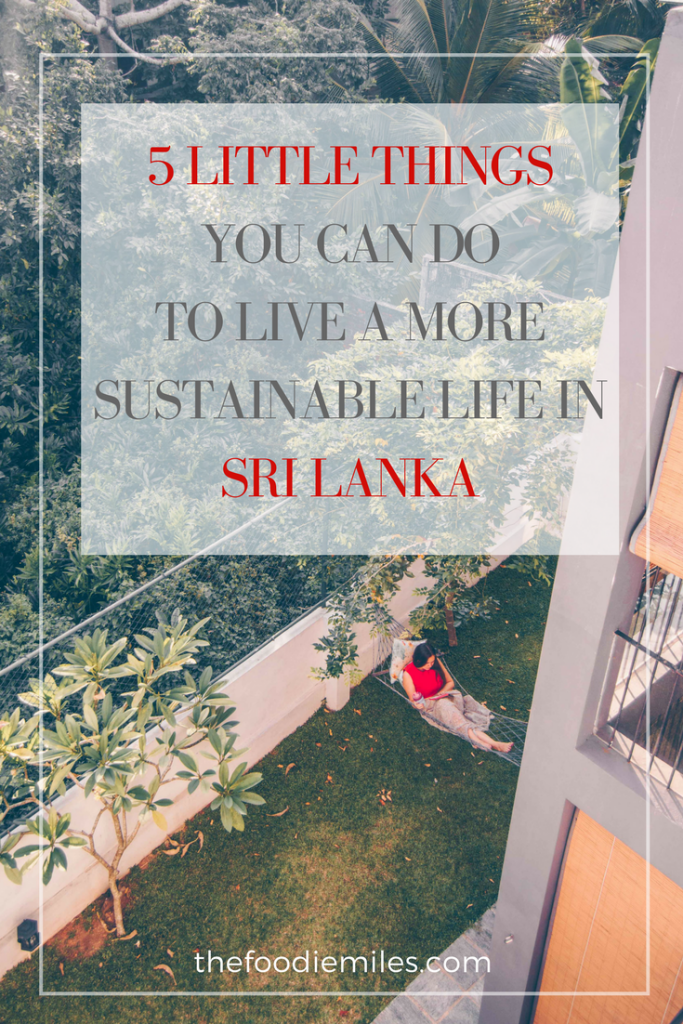




So true Yulya! I agree with everything you say and try to follow the same steps to reduce my impact on our earth. Sometimes it gets really hard. Especially here, in Asia, where plastic seems to be everywhere..
Thank you for support, Anya! I think even doing little steps goes a long way. We all have to start somewhere!
Yulia, your tips are essential for all persons who care about the earth. It is our home. As a Christian, I believe we all have a duty to ourselves, other living beings, and the Creator to respect and care for the world. The tips shared in this article are practical and will benefit present and future generations.
Happy Tuesday
Thank you, Ashlee! Although I wrote this article based on my experience of living in Sri Lanka, I do believe anyone in the world, no matter where they live, can do these little changes to their lifestyle. Thank you for your support!
Awesome article Yulia
Thank you, Madhumal! :*
Hi there. I currently work for a company in the uk called unpckd. We supply food such as rice, pasta, cereal, grains, nuts, chocolate cleaning and beauty products, all plastic free. We deliver in our cotton bags or glass jars and our customers decant into their own
Bottles etc. I’m am looking to relocate to Galle in the near future. Do you think a business like this could work there?
Hi Kirsty!
Sorry for the late reply. I think you could reach out to Good Market Sri Lanka and talk to them (maybe collaborate). They have been pioneers in promoting local, organic, sustainable products on the island and they work with many companies/individuals who share their principles.